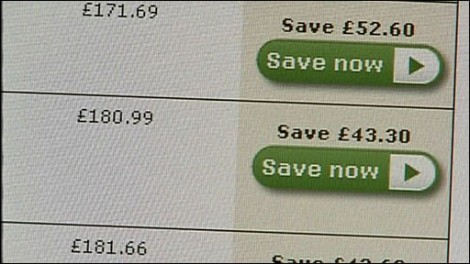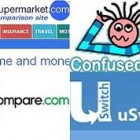
Any money savvy parent will tell you that shopping around is Always A Good Thing. the internet has made this so much easier with the springing up of all sorts of price comparison websites. Or has it? Do these websites actually save you money? I took a closer look, and found a few things that it is well worth keeping in mind to actually make sure that these sites will save you money when you're changing your insurance, credit card or energy supplier, and not cost you cash.
What is it?
A price comparison website is a site where you enter a search term for a specific good or services, and the site comes back with retailers or services providers selling that product, and how much it will cost. You can can then choose the product you want, based on, for example, the lowest price for the greatest amount of features.
 One of the most well known is Compare the Market.com. If only for those adverts that appear to be just about everywhere. Who would have thought that a company could do so well out of an advertising campaign based on an almost racist generalisation that East Europeans sound like they're saying Meerkat when they say Market?!
One of the most well known is Compare the Market.com. If only for those adverts that appear to be just about everywhere. Who would have thought that a company could do so well out of an advertising campaign based on an almost racist generalisation that East Europeans sound like they're saying Meerkat when they say Market?!
How does it work?
Price comparison websites make a little bit of money everytime you use a link through from their site. They make this money off of the company you're linking too, and this is something all organisations will have accounted for anyway. They all have advertising budgets, and some of that will be set for online marketing. In all, the amount of money they will need to allocate to the internet is small compared to what they'll spend advertising and marketing elsewhere. So in short, you'll save time, and the price comparison site makes money.
This free to the user aspect is very important in powering the internet. Services can only be provided if, somewhere along the way, someone pays. But it won't be you according to the latest research from McKinsey (a major research firm). Today it reported that 40% of us wouldn't use that internet AT ALL if it wasn't entirely free!
 Free services are pretty important according to the study. It found that "Europeans now spend an average of 24 hours on the internet every month. Once we’ve paid for our internet access, almost all of the services that we use regularly – from email, instant messaging and maps to social networks, gaming, music and video sites, and to search and price comparison – are free, funded largely by online advertising."
Free services are pretty important according to the study. It found that "Europeans now spend an average of 24 hours on the internet every month. Once we’ve paid for our internet access, almost all of the services that we use regularly – from email, instant messaging and maps to social networks, gaming, music and video sites, and to search and price comparison – are free, funded largely by online advertising."
Does it work?
Looking around for information to support the effecitveness of comparison sites actually turned out to be tougher than I thought. First off, while I knew that not all companies were included on these sites, I had NO idea how widely this varied. A study by the Times found that prices varied hugely from site to site when the same search criteria was used. So it is worth using more than one site! Second, the information presented by these sites isn't as straightforward as you might think either.
 Earlier this year James Daley, editor of Which? Money magazine, was quoted as saying in an article in the Daily Mail that "These are ruthlessly commercial organisations trying to make as much money as possible. They are not necessarily working in the best interests of the consumer."
Earlier this year James Daley, editor of Which? Money magazine, was quoted as saying in an article in the Daily Mail that "These are ruthlessly commercial organisations trying to make as much money as possible. They are not necessarily working in the best interests of the consumer."
Pretty strong stuff! The same article also describes two typical scenarios. "Among the pricing scams is the use of high excesses of up to £500 on motor insurance policies. This allows a site to quote a cheap price, but when they claim motorists find they have to pay most or all of the repair costs themselves.
In home insurance, one ploy is to quote a price that assumes a property is occupied all day. If you miss or ignore that default answer, your policy could be ruled invalid when it comes to making a claim."
How do I compare thee?
Well for starters I'd use a comparison website as a starting point only. If it appears to be too confusing to figure out what it's search results means, then look at another site. Don't just go for the bottom figure.
 I think they work well when you're looking for a service like insurance or a mobile phone tarrif. In my personal experience though, not even Google Shopping really works when you're trying to buy a product though, not if you want a really cheap deal. I've saved more in the last year since I started looking at sites like HUKD.com and PlayPennies, and grabbing discount opportunities when and as they arrive. I've already bought nearly all my son's Christmas presesnts, and spent half what I did last year!
I think they work well when you're looking for a service like insurance or a mobile phone tarrif. In my personal experience though, not even Google Shopping really works when you're trying to buy a product though, not if you want a really cheap deal. I've saved more in the last year since I started looking at sites like HUKD.com and PlayPennies, and grabbing discount opportunities when and as they arrive. I've already bought nearly all my son's Christmas presesnts, and spent half what I did last year!
And Finally...
What has been your personal experience? Mine hasn't been so good. We did really well with our car insurance, but when it came to travelling in the US, I found that Direct Line (which doesn't use comparison websites) was actually the best deal for what I needed.
I've also had a dreadful experience with switching our gas and electricity provider. Despite the supposedly low tarriff, their utter inability to send anyone to read the meter when there was someone at home to let them in meant we were almost continuously being billed a hideous amount on an 'estimated' reading. I found customer service appalling when trying to get the endless mistakes sorted out. In the end we went back to our old supplier, and have found that despite being supposedly more expensive, we actually have spent less with them in the last year!






















Comments